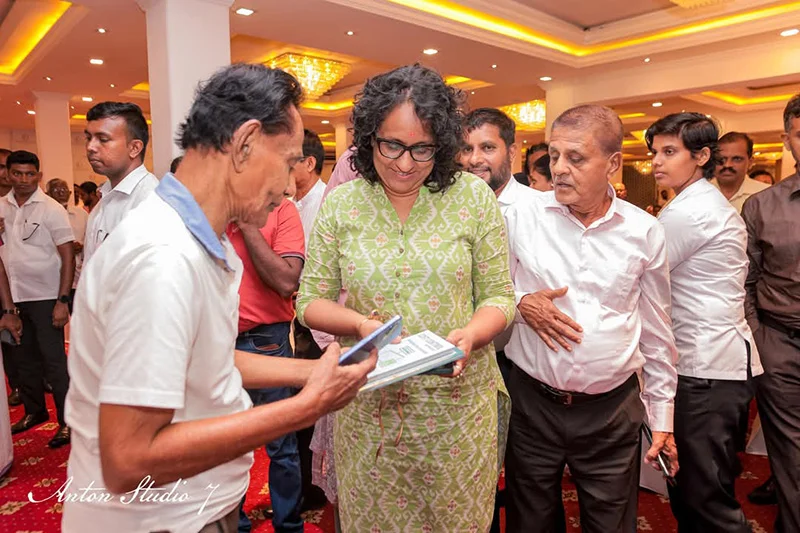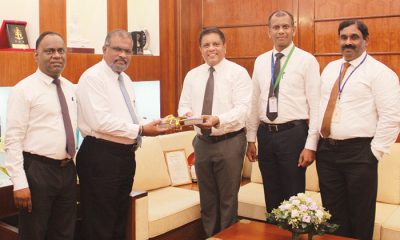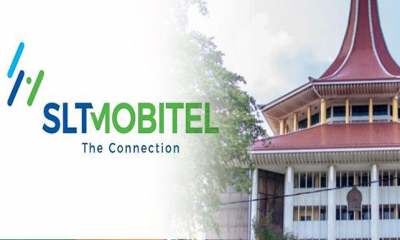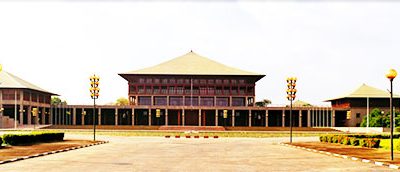Business
SLT statement on media coverage of Board changes

The Board of Directors (“Board”) of Sri Lanka Telecom PLC (“SLT”) refer to the recent media coverage of Boardroom changes at SLT.
This note is to provide factual information and clarity on the corporate identity of SLT, the role, responsibilities, authority and accountability of management and the Board (including the Chairman of the Board), and in particular the separation of powers between the Board and Management. All of the information in this note is already available in public sources.
SLT was incorporated under the then Companies Act No. 17 of 1982 (now superseded by the Companies Act No.7 of 2007). SLT is listed and quoted on the Colombo Stock Exchange (“CSE”) and is governed via the tenets of SLT’s Articles of Association (“Articles of Association”). The Government of Sri Lanka and Global Telecommunications Holdings (“GTH”) have a 49.5% and 44.98% equity interest in SLT. SLT has about 13700 other shareholders. As disclosed in the Annual Report, GTH is wholly owned by Usaha Tegas Sdn Bhd, which is incorporated in Malaysia. SLT is therefore not a state-owned corporation nor a government organization as opposed to government corporations established under separate enactments.
As a listed company, SLT complies with the CSE Continuing Obligations and the Code of Best Practice on Corporate Governance (“CG Code”). A copy of the Articles of Association is available for review at its registered office and the websites of SLT and CSE.
The Board plays a stewardship role in accordance with the CG Code which provides details on the role, responsibilities and authority of the Board and Management.
The Board, including the Chairman, is non-executive. This means that no director, including the Chairman of the Board, has the authority to make individual decisions or give individual instructions to members of management or staff. Board decisions and instructions are made and conveyed by formal, minutes and collective Board decisions.
The position of the Chairman at SLT is not to be confused with that of Executive Chairman in other public companies or State-Owned Corporations. The Chairman of the SLT Board has the primary role to chair board meetings and facilitate and ensure the workings of the Board. The Chairman is appointed by the Board in accordance with the Articles of Association.
All Directors, including the Chairman are non-Executive and are not employees of SLT. Their role is not full time. They are therefore not entitled to a salary nor benefits that accrue to employees. All Directors in SLT, including the Chairman, do receive fees for the discharge of their fiduciary duties.
SLT is led by a Chief Executive Officer (“CEO”) who is appointed by the Board. It is the CEO and the management team that operate the business and make the executive decisions within the powers provided to them by the Articles of Association. The CEO is an employee and is paid a salary.
The separation of powers, that the Board undertakes the oversight role and the management the executive role, ensures clear delineation of roles, responsibilities, authority and most importantly, accountability.
Compliance with related party transactions and its related disclosures in accordance with Sri Lanka Financial Reporting Standards 24 are monitored by the Related Party Transactions (“RPT”) Committee of the Board. The Board wishes to confirm that the present Chairman has not only disclosed his related party interests but that he has in fact made disclosures over and above regulatory requirements. The Board has robust controls in place to ensure that if a director does not disclose related party interests or interferes in areas where there is conflict, the Board will take the necessary action in accordance with the law and regulations.
The Board does hope that this statement provides clarity for the informed stakeholder. We humbly request that aggrieved and interested parties that have concerns regarding the governance of SLT address the appropriate forum of the regulatory authorities or the courts of law. The Board will not want to enter into the bowels of public debate and correct each and every uninformed, misguided, erroneous or unwarranted statement.
Business
SL’s construction sector ‘bleeding billions’ due to weak cost-control mechanisms

Sri Lanka’s construction sector one of the country’s largest economic drivers, continues to bleed billions due to weak cost-control mechanisms, ad-hoc estimating practices and the absence of internationally recognised methodologies, warns veteran Chartered Quantity Surveyor Mafahir Shuhood, a global authority in building economics whose work has shaped industry standards across continents.
A member of IQS (Sri Lanka), AIQS (Australia), ASAC (USA) and CIRB (UK), Shuhood is widely considered a pioneer of modern cost management. His first book, How to Estimate for Building Works, written in 1978, became one of the region’s earliest structured guides on controlling construction expenditure.
His subsequent publications—Cost Control Methodology and Costing Guide, authored in Qatar—today form part of the reference material used by universities, engineers and international contractors from Doha to London and Sydney.
“My methodologies are being used worldwide. Sri Lanka must now bring the same discipline and scientific approach if it wants financial stability in its construction sector, Shuhood told The Island Financial Review.
At the recent BMICS Exhibition in Colombo, all available copies of his books were sold within hours, signalling the growing demand among local professionals for structured, globally aligned cost-control knowledge.
According to Shuhood, Sri Lanka’s project inefficiencies stem from the lack of a unified national system to estimate, monitor and analyse costs. He argues that building economics is not merely a technical discipline,
it is a national economic safeguard.
“Before constructing anything—a house, a building or a public infrastructure project—you must assess materials, labour, wastage, inflation, time and value. Without a scientific system, cost overruns are inevitable, he said.
He believes that the country’s persistent budget blowouts in major infrastructure projects could be avoided with proper cost-control frameworks and independent monitoring.
“Sri Lanka cannot afford imprecision. Every unnecessary cost ultimately affects the national economy.”
Shuhood revealed that he recently met the Prime Minister and shared his recommendations, including copies of his internationally used publications.
“I told the Prime Minister that my advice is not for money. I am prepared to support Sri Lanka purely as a service. This is my profession since childhood, and I want to contribute meaningfully, he said.
He maintains that the introduction of a national cost-control discipline—developed using proven international best practices—could save the country billions in project overruns and miscalculations.
By Ifham Nizam
Business
InsureMe debuts on CSE Empower Board

InsureMe Insurance Brokers Ltd successfully completed its Equity Introduction and subsequent listing on the Empower Board of the CSE recently marking a significant milestone for a local digital-first enterprise.
InsureMe Insurance Brokers Ltd (InsureMe) rang the market opening bell at a market opening ceremony, held at the CSE’s iconic Trading Floor, to commemorate its landmark listing on the Empower Board. highlighting InsureMe’s commitment to digital transformation and its success as a rapidly growing Insure-Tech firm leveraging the capital market for growth.
Founded in 2016 as startup, InsureMe is a digital insurance aggregator and a fully licensed broker regulated by the Insurance Regulatory Commission of Sri Lanka (IRCSL) with a digital-first operating model supported by online assistance and end-to-end digital claims support, operating with advanced platforms such as DigiEye (Motor Claims Automation), DigiMed (Medical Claims Automation), and DigiEx (Corporate Expense & Reimbursement Automation).
Delivering the welcome address at the event, Rajeeva Bandaranaike, CEO of the Colombo Stock Exchange, congratulated InsureMe on their successful listing. Remarking upon the occasion and InsureMe’s role as successful startup leveraging the capital market, he stated: “InsureMe is one of the very few startups in Sri Lanka making a debut on the Stock Exchange and as the sixth company on the Empower Board and is an innovator in the technology start up space. We are happy to see companies such as InsureMe involved in the IT sector making use of the capital market. When we set up the Empower Board, this is precisely what we had in mind.”
Prajeeth Balasubramaniam Chairman of InsureMe Insurance Brokers Ltd also remarked the companies list, remarking: “This listing represents far more than a financial achievement; it signals strong confidence in Sri Lanka’s burgeoning startup ecosystem and urges us all to aim higher. It demonstrates how visionary teams, armed with essential resources and guidance, can reshape industries and alter the national narrative. “
Also speaking the event Vipula Dharmapala, CEO and Director of InsureMe Insurance Brokers Ltd discussed the companies’ journey, stating: “InsureMe began almost a decade ago when my co-founders and I set out to give Sri Lankan customers the same transparent and convenient digital insurance experience enjoyed in other markets. Guided by our vision of ‘Insurance Made Easy’, we have grown through continuous innovation, digitising policy access, enabling online insurance claims, and developing advanced claims-automation solutions now being deployed in Sri Lanka and overseas.”
The capital raised through the listing is expected to strengthen InsureMe’s capital base and support its strategic expansion into cutting-edge technology adoption, product diversification, and enhancing its digital platform for seamless customer service. These initiatives are aligned with its goal of becoming the most preferred digital insurance intermediary in the country, fostering greater insurance penetration through easy-to-use digital channels.
Business
JXG awarded top honour for Parent-Inclusive Workplace practices 2024/2025

JXG (Janashakthi Group) was recently recognised with the Parent-Inclusive Workplace of the Year 2024/25 Award at the Parent-Inclusive Workplaces Summit 2025. Held at the Courtyard by Marriott, Colombo, the recognition reflects JXG’s commitment to fostering a supportive, empowering, and inclusive environment for working parents.
Positioning JXG as a benchmark for parent-friendly workplace practices in Sri Lanka, the award aligned with global diversity, equality and inclusion (DEI) and family-friendly workplace standards, recognising JXG’s achievements with the highest score in all five sub-categories of the Parent-Inclusive Workplaces Summit 2025. The categories included Best CEO/Leadership Initiatives for Working Parents, Best HR Policies Empowering Working Parents, Best Workplace Culture for Parents, Best Well-being Initiative for Working Parents, and Most Innovative Initiative Supporting Working Parents.
Discussing the award, Wasanthi Stephen, Group Chief Human Resources Officer at JXG said, “Family is at the heart of our policies, culture, and infrastructure. We recognise the importance of dedicating time to family and how it strengthens talent retention while encouraging workplace loyalty. This award not only reaffirms our efforts to meet the emotional and practical needs of our JXG families but renews our commitment to helping our employees thrive professionally while cultivating their personal lives.”
JXG’s progressive HR policies, culture-building efforts, and well-being initiatives demonstrate a comprehensive and sustained approach to parent inclusivity. The initiatives include up to twelve weeks of fully paid maternity leave with the option of a two-month extension on half pay. Similarly, fathers can apply for two weeks of fully paid paternity leave with additional paid leave upon request. JXG also offers parents versatile arrangements including remote work, flexible scheduling, and permission for parents to attend school and family events without having to take leave.
-
News7 days ago
Lunuwila tragedy not caused by those videoing Bell 212: SLAF
-

 News2 days ago
News2 days agoOver 35,000 drug offenders nabbed in 36 days
-

 News5 days ago
News5 days agoLevel III landslide early warning continue to be in force in the districts of Kandy, Kegalle, Kurunegala and Matale
-

 Business4 days ago
Business4 days agoLOLC Finance Factoring powers business growth
-

 News4 days ago
News4 days agoCPC delegation meets JVP for talks on disaster response
-

 News4 days ago
News4 days agoA 6th Year Accolade: The Eternal Opulence of My Fair Lady
-

 News2 days ago
News2 days agoRising water level in Malwathu Oya triggers alert in Thanthirimale
-

 Midweek Review7 days ago
Midweek Review7 days agoHouse erupts over Met Chief’s 12 Nov unheeded warning about cyclone Ditwah

























